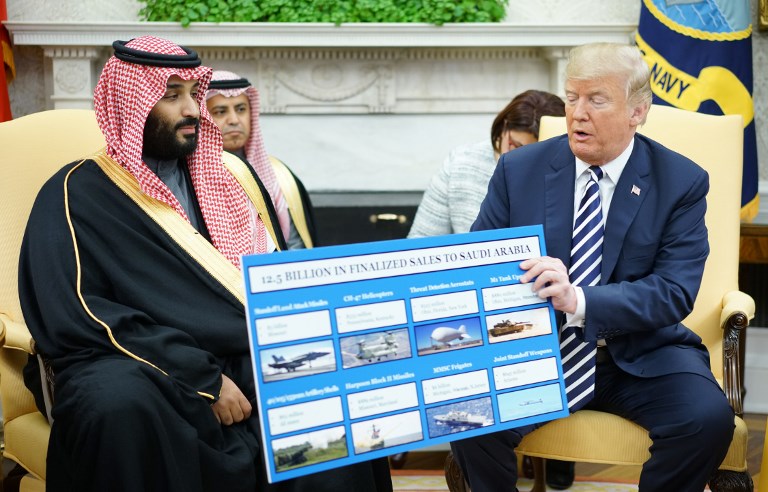Three years ago, Donald Trump’s incoming administration touted its ability to bring peace to the Middle East, and in particular to resolve the Israeli-Palestinian conflict. Instead, this administration has adopted several initiatives that will cause more turmoil and put an end to America’s dominance in the region.
While the British manipulated the Middle East for centuries and withdrew more or less orderly, the American foray will be short-lived and result in a humiliating exit, leaving the region in flames.
Three realities underlie the Middle Eastern powder keg: decades of oppressive and corrupt rule, sectarian and ethnic divisions, and the Israeli-Palestinian conflict. The U.S. could have played an unselfish, impartial, and helpful role, but instead has been selfish, taking sides, and adding further fuel to the fire, especially during the Trump administration.
Oil in the Middle East
In the aftermath of WWII, the U.S. was seduced by the region’s oil riches. Washington embraced oppressive rulers who supported America’s business. By supporting dictators in the name of “stability and peace,” American companies and individuals profited. Some went even further and espoused the ridiculous belief that Islam and democratic values were incompatible. All the while, reform was stifled.
In countries impeded by political, social, and economic failure but blessed with abundant oil riches, corrupt rulers robbed the people of wealth belonging to current and future generations of citizens.
Oppression sucked all hope from the people of the region with a landscape of corruption, inequality, little opportunity for development, no hope for a better future, and conflict or impending conflict on the horizon.
US Support of Dictators
There are many prominent instances of the U.S. supporting dictators in the Middle East.
Washington backed the Shah in Iran ending in a violent revolution, Saddam Hussein in Iraq – in part to confront the Islamic Republic of Iran – concluding in two wars and continued turmoil, Zine El Abidine Ben Ali in Tunisia leading to a revolution, Hosni Mubarak in Egypt ending in a revolution and now Abdel Fattah el-Sisi with an impending revolution, and the ruling royal family in Saudi Arabia with their offspring Mohammad bin Salman facing growing internal unrest.
Under Trump, America’s embrace of Mohammad bin Salman and el-Sisi has been over the top. President Trump made Saudi Arabia his first foreign visit. His son-in-law and senior advisor Jared Kushner forged a high profile and all-in relationship with the Saudi crown prince.
Trump overruled the U.S. Congress and sold lethal weapons to Saudi Arabia in its disastrous war in Yemen with thousands of causalities. President Trump is among the few world leaders who have not acknowledged Mohammad bin Salman’s direct implication in the brutal murder of dissident journalist Jamal Khashoggi.

The likely fallout of America’s ongoing support of past and present dictators is that some currently unknown event in Egypt or Saudi Arabia will trigger a conflict that overthrows the government with a strong backlash against the United States. While the hypothetical spark could be something small – such as a hike in gas prices as in France and Iran or a rise in metro fares as in Chile – the event could morph into something much bigger because of underlying grievances brewing for years.
In the Middle East, grievances will eventually shift from attacks on rulers to attacks on the U.S. who supported them, spreading to other countries where people have similar grievances.
Sectarian and Ethnic Conflicts
For decades, the Middle East has been overwhelmed by divisive sectarian and ethnic conflicts, the most prominent being Shia-Sunni, Arab-Persian, and Kurd-Arab-Persian. Washington was behind the Sunni Saddam Hussein in the Iraq-Iran War, but then invaded Iraq in 2003 and helped put the Shia in power with leaders Saddam closely tied to Iran.
America supports and needs the Shia-dominated government of Iraq in the fight against ISIS, Al-Qaeda, and other radical Jihadists who all ironically get financial support from Saudi Arabia, a staunch U.S. ally. Because of Washington’s association with the Sunni Mohammad bin Salman, the U.S. is connected to his suppression of Shia in the Eastern Province of Saudi Arabia and Bahrain and overtly in his war in Yemen.
Much the same is in play when the U.S. supports Arabs, Kurds, or Persians against each other. Washington inserts itself in ethnic struggles, which invariably transform into sectarian conflicts as do sectarian into ethnic. It is an interconnection virtually impossible to avoid.
American policymakers may think they are not involved in sectarian and ethnic struggles, but they are smack in the middle whenever the U.S. puts itself between Iran and Saudi Arabia, or more recently between Iraq and Saudi Arabia, Syria and Saudi Arabia, Kurds and Turkey, and Yemeni factions and Saudi Arabia.
Most recently, the U.S. abandoned its Kurdish allies, who were instrumental in the fight against ISIS. Although there are several conflicting Kurdish factions in the region, all Kurds must be somewhat shaken by Washington’s entangled alliances. Kurds are the world’s largest stateless ethnic group and wary of alliances because they were promised their own country after WWI and then betrayed by the allies and Turkey.
Taking sides has ominous implications. By supporting one side or the other in sectarian and ethnic struggles, the U.S. is involved in a global struggle where victims and their families have a long memory, which could have serious blowback.
Israeli-Palestinian Conflict
While the Israeli-Palestinian conflict may appear unrelated to other disputes, nothing in the Middle East stands by itself.
The struggle is on the mind of Arabs and, indeed, most Muslims from the Middle East to Malaysia and Indonesia. The Trump administration’s recent steps – abandoning the two-state solution, moving the U.S. Embassy to Jerusalem, and stating that Jewish settlements in the West Bank, Golan Heights, and East Jerusalem are not inconsistent with international law – will further alienate hundreds of millions of Muslims from the United States.
Many fear Trump's announcement pretending Israel's illegal settlements don't violate the 4th Geneva Convention will lay the groundwork for annexation. That'll leave three choices in the one-state reality:
1. Mass expulsion.
2. Equal rights.
3. Apartheid. https://t.co/8PZUtxcr4h— Kenneth Roth (@KenRoth) November 19, 2019
The 180-degree shift in Washington’s stance on settlements appears to be targeted to President Trump’s domestic base with no appreciation of the longer-term fallout for U.S. interests. Although President Ronald Reagan in 1981 declared that settlements were not illegal, he went on to ask for a total settlement freeze.
Future Implications
The future implications of U.S. policies – support for oppressive dictators, taking sides in ethnic and sectarian disputes, and abandoning the Palestinians – would not be so ominous if the people in the Middle East were not oppressed and living under extreme inequality, with limited opportunity for self-development and little hope for a better future.
While governments are ultimately responsible for their policies, the U.S. is invariably seen as a partner in this state of affairs because of support for rulers who could be swept away if it were not for Washington’s support. The people of only one country, Iran, cannot blame the U.S. for their leaders. But even in Iran, where the U.S. was more popular than in Arab countries, America is becoming increasingly vilified because of President Trump’s harsh sanctions that are depriving average Iranians of imported goods including medicines.
Muslim countries in the Middle East and North Africa cannot go on as they have for much longer. They need reforms that include the rule of law, freedom, more equal societies, and better opportunities. Pressure has been building because of oppressive dictators, many supported by the United States. If these needs are not addressed soon, a new leader or incident will spark tumultuous conflict across the Middle East, toppling regimes, endangering Israel’s survival, and ultimately forcing the United States to abandon the region.






















